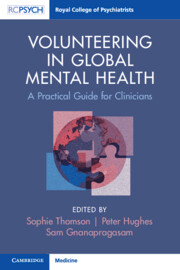Book contents
- Volunteering in Global Mental Health
- Reviews
- Volunteering in Global Mental Health
- Copyright page
- Contents
- Foreword
- Contributors
- Introduction
- Section 1 Key Principles, Theory and Concepts
- Section 2 Practical Guide and Toolkit
- Section 3 Reflective Accounts and Perspectives of Global Mental Health Volunteering
- Chapter 12 Myanmar: Mental Health Training, Recipient Perspective
- Chapter 13 Myanmar: Mental Health Training, Trainer Perspective
- Chapter 14 Somaliland: Mental Health Training, Recipient Perspective
- Chapter 15 Somaliland and Malawi: Mental Health Training, Trainer Perspective
- Chapter 16 Zimbabwe: Diaspora Perspective of Volunteering
- Chapter 17 Sierra Leone: Capacity Building, Trainee Perspective on Volunteering
- Chapter 18 Chad, Darfur, Haiti, Sierra Leone and Bangladesh: Humanitarian Field Experiences
- Chapter 19 Sudan: Mental Health Training, mhGAP Trainer Perspective
- Chapter 20 Kashmir: Mental Health Training, Royal College of Psychiatrists’ VIPSIG Training Programme
- Chapter 21 Ghana: Supervisor Perspective, RCPsych Volunteer Programme
- Section 4 Future of Global Volunteering
- Book part
- Glossary
- Index
- References
Chapter 14 - Somaliland: Mental Health Training, Recipient Perspective
from Section 3 - Reflective Accounts and Perspectives of Global Mental Health Volunteering
Published online by Cambridge University Press: 08 November 2023
- Volunteering in Global Mental Health
- Reviews
- Volunteering in Global Mental Health
- Copyright page
- Contents
- Foreword
- Contributors
- Introduction
- Section 1 Key Principles, Theory and Concepts
- Section 2 Practical Guide and Toolkit
- Section 3 Reflective Accounts and Perspectives of Global Mental Health Volunteering
- Chapter 12 Myanmar: Mental Health Training, Recipient Perspective
- Chapter 13 Myanmar: Mental Health Training, Trainer Perspective
- Chapter 14 Somaliland: Mental Health Training, Recipient Perspective
- Chapter 15 Somaliland and Malawi: Mental Health Training, Trainer Perspective
- Chapter 16 Zimbabwe: Diaspora Perspective of Volunteering
- Chapter 17 Sierra Leone: Capacity Building, Trainee Perspective on Volunteering
- Chapter 18 Chad, Darfur, Haiti, Sierra Leone and Bangladesh: Humanitarian Field Experiences
- Chapter 19 Sudan: Mental Health Training, mhGAP Trainer Perspective
- Chapter 20 Kashmir: Mental Health Training, Royal College of Psychiatrists’ VIPSIG Training Programme
- Chapter 21 Ghana: Supervisor Perspective, RCPsych Volunteer Programme
- Section 4 Future of Global Volunteering
- Book part
- Glossary
- Index
- References
Summary
Somaliland is situated in the Horn of Africa. It has experienced decades of civil unrest, poverty and climate adversity. It became a self-declared independent country in 1991, separate from Somalia.
- Type
- Chapter
- Information
- Volunteering in Global Mental HealthA Practical Guide for Clinicians, pp. 132 - 135Publisher: Cambridge University PressPrint publication year: 2023



